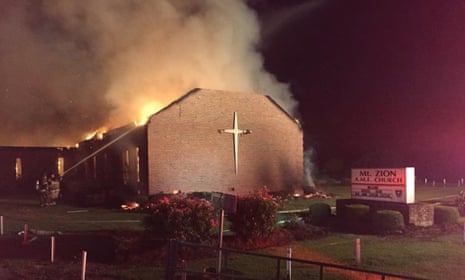Investigators said on Thursday that the most recent of seven fires at predominantly black churches in the American south “was best classified as natural”, ending several days of speculation over whether it was intentionally set.
The South Carolina Law Enforcement Division ruled that the fire at Mount Zion African Methodist Episcopal (AME) Church in Greeleyville, South Carolina, was not intentional, a decision which which the Williamsburg County Sheriff’s Office and the Bureau of Alcohol, Tobacco, Firearms and Explosives agreed.
“Investigators observed no indicator of criminal intent,” Sled spokesperson Kathryn Richardson said in a statement. “The investigation is complete.”
A spate of fires has followed the racially motivated killing of nine people at a church in Charleston, South Carolina, last month, provoking concerns that the incidents were related. Black churches have been targeted by racists since at least the early 19th century.
Police and firefighters had earlier disputed an anonymous report claiming that the fire was caused by lightning.
The Associated Press and the New York Times both cited an anonymous law enforcement official who said that a fire at Mount Zion African Methodist Episcopal (AME) Church in Greeleyville was caused by lightning.
“Bogus, bogus. We just don’t know yet,” Williamsburg fire chief Randy Swinton told the Post and Courier of the reports.
Only the walls of the church were left standing at Mount Zion, a church that was burned to the ground by the Ku Klux Klan in 1995.
Craig Chillcott, a senior agent with the Bureau of Alcohol, Tobacco, Firearms and Explosives in South Carolina, said no cause had been ruled out in the ongoing investigation of the church fire. And chief Mark Keel of the State Law Enforcement Division said: “We can’t make a definitive call yet.”
The other churches to catch fire since the 17 June mass killing:
College Hill Seventh Day Adventist Church in Knoxville, Tennessee, where the apparent cause of the incident was vandalism and not a hate crime, according to the fire department. Pastor Cleveland Hobdy III said he thought someone was trying to intentionally damage the church.
God’s Power Church of Christ in Macon, Georgia was heavily damaged by a fire that is still being investigated by federal agencies, which have not determined what caused it.
Authorities said a fire at Briar Creek Road Baptist Church in Charlotte, North Carolina was intentional, but there is not yet evidence that it was a hate crime. The investigation is ongoing.
Glover Grove Baptist Church in Warrenville, South Carolina was destroyed by a fire that authorities have not determined the cause of.
Greater Miracle Apostolic Holiness Church in Tallahassee, Florida caught fire after a tree fell on electrical wiring. For the past two months, the church had a sign posted outside that said: “Call 911. This church is on fire.”
The federal Bureau of Alcohol, Tobacco, Firearms and Explosives (ATF) said that a fire at Fruitland Presbyterian Church in Gibson County was ruled accidental.
Data from the National Fire Protection Association shows that fire departments responded to an average of 1,780 structure fires per year at churches between 2007 and 2011. This means any fire that occurs in the structure, even if the building was not damaged.
The predominant cause of the fires was from cooking equipment, though arson accounted for 16% of the fires – about 280 churches per year.

Comments (…)
Sign in or create your Guardian account to join the discussion